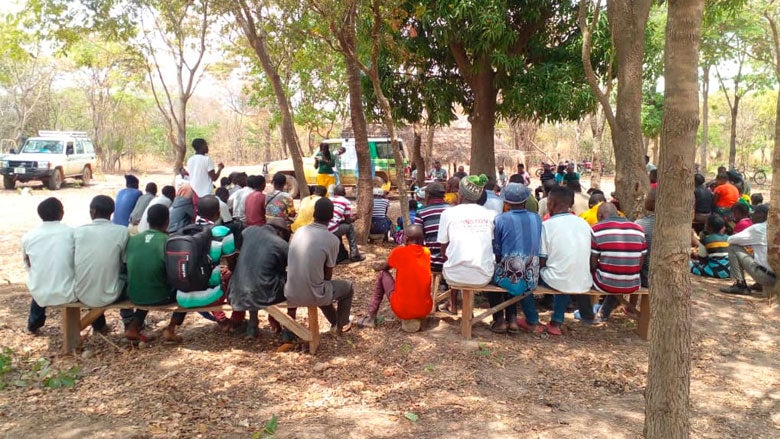 Beneficiaries pruning tomatoes at twaipela cooperative Photo: Chama Zimba
Beneficiaries pruning tomatoes at twaipela cooperative Photo: Chama Zimba
Communities possess shared values of togetherness that need to be harnessed and supported to improve and sustain project outcomes. Within their socio-cultural and economic contexts, they make rational decisions regarding the use of resources for their survival and prosperity. Community participation in natural resources management project activities is hailed as an important requisite for long-term sustainable use of natural resources by sharing in the costs and benefits of that resource use.
How then does social capital matter in enhancing success of natural resources management projects? To what extent does investing in social relations strengthen community response and ownership of project achievements?
In this blog, we share our field experience from the $100 million, IDA-funded Transforming Landscapes for Resilience and Development (TRALARD) project, whose development objective is to improve natural resource management in selected districts of Zambia. The project is designed to support sustainable livelihoods and, in the event of an eligible crisis or emergency, provide immediate and effective response. It is also designed to instill ownership and sustainability in the management of resources. While part of the evaluation of project proposals, the role of social capital at community level has not received the same level of acknowledgement. By social capital, we refer to the informal networks and relations that community members invest in one another to make their life together livable. The level of their investment in social relations strengthens a sense of trust and belonging.
As TRALARD approaches its mid-term marker, we want to highlight the importance and role of social capital at community level as an important ingredient of dynamics often overshadowed by the focus on concrete socioeconomic benefits that development projects seek to achieve. In TRALARD, social capital has emerged as a driving force in community-level socioeconomic and environmental benefits and as an outcome of community engagement.
TRALARD’s approach has been to ensure that products and services are as close to the direct beneficiaries as possible by engaging them in every process, including their role in leading the identification and prioritization of livelihood options, the selection of areas for community forest management and natural forest regeneration, and in the determination of structures for bulking centers that reflect the way their villages are set up. The project operates in the Luapula, Muchinga, and Northern provinces of Zambia.
By working together to achieve what communities prioritized for themselves, community members have invested more in the social relations that have strengthened their sense of belonging to a common community-level agenda of environmental management and broadening the portfolio of community socioeconomic assets. The social capital outcome in TRALARD has emerged as a factor of great relevance in the reduction of poverty and sharing of socioeconomic gains embedded in trust.
Our field observations offer some examples: Kachamu, a women-branded cooperative in Mpika, Muchinga province, received support from TRALARD to construct a piggery unit and build a water system with a solar-powered water pump and water tank, to use for gardening and in the piggery. Ms. Mwansa, Kachamu’s chairperson, explains that the name Kachamu reflects its three founders—Kasonde, Chama, and Mulenga, who came together to exchange ideas about founding a women’s club that would help them pull themselves out of chronic poverty—way before TRALARD began.
The cooperative has a bank account for savings to expand the piggery because the pigs have multiplied to over 30 from the initial five. Dominated by women (87%), men were only allowed to join the cooperative recently to support it in constructing the garden fence and clearing land for gardening. Women are coming together and have learned animal husbandry practices and land management with support from government extension services.
Preventing tragedy of the commons
In rural Zambia, forest landscapes, including marshlands, tend to be common resources, the sustainable management of which requires community effort. Thus, in the absence of secure forest tenure and sufficient legal forest, user rights for forest communities, open access, and the indiscriminate exploitation of forests are not uncommon.
If you want to go fast, go alone. If you want to go far, go together.
African Proverb
By drawing on social capital, however, community members come together and agree to organize themselves around regulations that support mutual accountability in the access, use, and management of natural resources. They define forest rights and responsibilities that determine levels of access and use for the overall benefit of the community. Open access, and the indiscriminate exploitation of resources for personal gain at the expense of the socioeconomic wellbeing of other community members, is frowned upon. Social capital thus contributes to improving sustainable forest use in ways that unlock the potential of forest resources.
These can improve the wellbeing of forest-dependent communities and their resilience to shocks. This is what a Community Forest Management Group in Koloswe Mpika District did to preserve 1,053 ha of land. Ms. Ivy Kunda, its chairperson, says the community has agreed to set aside land as a forest. Youth have volunteered to be honorary forest officers to guard against practices prohibited in their regulations.
Having a broader understanding and knowledge of natural resources management is important in enhancing the value of traditional knowledge. Often, this broader view comes from outside, in the form of extension service providers and other technical support teams.
TRALARD was designed to ensure this interaction takes place. Ms. Frideswide Chiliboy of the Mpika District Women’s Association says it has received regular support in animal and crop husbandry from sub-national government officers. The association has poultry and a plantation of bananas, intercropped with vegetables.
Social capital calls for attention to existing values and investment in community relations to help us understand how these positively (or negatively) influence outcomes. The success of a project is likely, in turn, to strengthen social capital, community ownership, and sustainability.






Join the Conversation